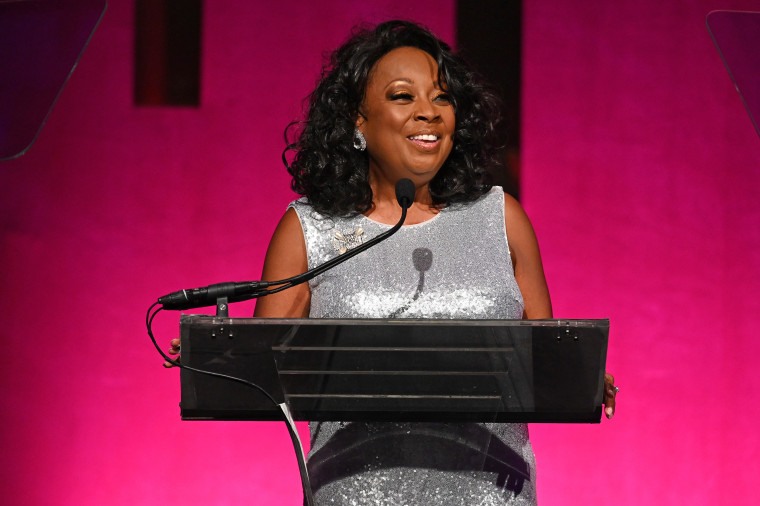You may know Star Jones as an esteemed lawyer who spent nine seasons as a co-host on “The View,” but after surviving open heart surgery in 2010, Jones has now taken on the role of an advocate for women’s heart health.
NBC News’ Know Your Value spoke with Jones as part of the American Heart Association’s Go Red for Women initiative, which aims to educate women about heart disease so that they can make healthier lifestyle choices. Heart disease is still the number one killer of women, with one in three women dying from the disease each year.
Jones, 58, explained that she was diagnosed with heart disease in January 2010, but had been steadily working on improving her overall health since she decided to have gastric bypass surgery in 2003.
“In the words of one of my favorite movies, ‘Shawshank Redemption,' I truly had to get busy living or get busy dying,” Jones told NBC News’ Know Your Value. "So I chose to live, and gastric bypass weight loss surgery actually jump started my road to health … but changing my overall lifestyle has really helped me maintain 140-150 pounds of weight loss for a consecutive 18 years.”
Jones completely changed her lifestyle — she was hitting the gym every single day, exercising portion control and eating healthfully. That’s why it came as a shock when, in 2009, she started experiencing some strange symptoms. For years, she had blamed any odd symptoms on her weight, but at this point that hadn’t been a factor for quite some time.
“I just found myself short of breath and experiencing frequent and intense heart palpitations — like somebody was actually punching me in the chest constantly,” explained Jones. “I would get light-headed if I went from seated to standing too quickly. It was just weird, and I became alarmed at this obvious change in my health, especially since I had undergone successful weight loss surgery six years prior.”
So, Jones headed to her cardiologist’s office and started undergoing “a whole lot of tests.” She was diagnosed with heart disease in January 2010. This was when she got some extreme news from her doctor: she was going to need open heart surgery.
“The doctor told me that I needed the full-on, open-heart surgery,” said Jones. “I remember asking, ‘Oh are they gonna go through my armpit?’ and he was like, ‘Nah, I’m talking the real kind where they crack your chest and take your heart out of your body.”
Understandably, Jones panicked. Adding to the stress was the fact that the doctor had presented her with the option of “elective” open heart surgery. So, she had to choose when and if it was going to happen.
“I literally put my head in the sand,” says Jones. “I got on a plane and flew down to the Caribbean to be with my girlfriends for a beach party. I really did. And then, needless to say, after a week of refusing to deal with it, my girlfriends and family and doctors talked some sense into me and I made the decision.”
Jones took a second to explain exactly what “elective” meant in terms of her condition.
“This is what I want people to know: I had for all practical purposes ‘elective’ open heart surgery,” explains Jones. “But this is what the doctors told me — that I had a myriad of things going on with my heart. I had a malfunctioning aortic valve, I had a subaortic membrane which was a genetic disorder, and then my heart was not operating optimally after all those years of a sedentary and unhealthy lifestyle.”
Basically, if she refused the surgery, the doctor explained that in three years they would no longer be able to prepare her aortic valve and would instead have to replace it entirely. Her doctor explained that if she opted not to have her aorta repaired or replaced, she would end up needing a heart transplant.
“Now that stops you in your tracks,” said Jones. “So, in theory, I could say no I’m not gonna do it, but in reality, if I wanted to stave off what was coming, I had to do it.”
Jones made the call and underwent surgery. She said that the doctors completely stopped her heart on the operating table for 22 minutes, which is when a machine kept her alive. Jones made it through the surgery with no complications, and, as she recounted, “Walked out of the hospital six days later in some badass Jimmy Choo boots.”
Then, Jones was on to 24 sessions of cardiac rehabilitation, which she completed over the course of three months. This, she explains, was another huge hurdle.
“This is what people don’t get: The open-heart surgery can save your life, but cardiac rehabilitation is what’s necessary to get your life back,” says Jones. “Because the discipline necessary to strengthen your heart after open heart surgery is truly relentless and exhausting.”
On the day of her last rehabilitation session, Jones said she was finally able to walk the 12 blocks from her doctor’s office back to her apartment in New York City.
If she could give advice to her younger self, she would rewind to when she was 17 years old, before her weight gain ever started and tell herself to focus on her health.
She encouraged women to “know your numbers,” meaning their blood pressure, cholesterol, BMI and blood sugar. She also really wants women to make sure they’re visiting their doctors, eating colorful fruits and vegetables, maintaining a healthy diet and staying active.
“I used to think that my law degree was my greatest achievement. … That was a big deal to me,” says Jones. “But the biggest deal for everyone is to focus on their health.”
